
What Are The 6 Basic Types Of Screws? - SCREW STOP
Are you overwhelmed by the types of screws that are out there? Not sure what screw would be right for your project? We have good news.
You can master your next project once you know the six basic types of screws. This post will take you through the six fundamental screw types that every DIY enthusiast and season professional needs to know. These are enough to handle the majority of projects both in and around the house. Be it wood, metal, or concrete, we have you covered!
Why is it important to choose the right screw?
Selecting a screw for your next project may seem like a tedious task you don't want to tackle, but it's a fundamental step that can't be ignored. Running off with a popular choice may be tempting, but you are setting your project up for failure without a suitable fastener. So, let's understand why making the right choice is vital for you and your project.
Why does screw selection matter?
Screws are engineered with specific materials and designs in mind. They aren't a one-size-fits-all solution. Each screw is tailored to provide optimal results in their environment of choice. It also affects aesthetics and the longevity of your project. Wood screws are typically used in static environments, whereas machine screws are intended for moving parts. Indoor screws can normally get away with a mild zinc coating for corrosion resistance, while outdoor ones need a tougher black phosphate coating. So if you've wondered why multiple screws exist for the same material, the answer is environment.
Longevity of your projects
A primary reason for the meticulous screw selection process is protection. Every screw has one fundamental job. It is to secure and safeguard the materials that it will join. The screw needs to connect two materials and prevent wood splitting, drywall sagging, or metal slipping. That's why selecting the correct head type, length, and thread type is critical to ensuring protection. Using the wrong screw may work in the short term but will compromise your projects' structural integrity and safety.
The right screw minimizes risks like corrosion, split wood, faulty joints, and other safety concerns. By understanding the fundamental differences between screw materials and types, you can avoid quick wear-off and rusting, ultimately ensuring the longevity and stability of your DIY creations. A proper screw selection ensures a reliable and durable bond between materials.
Ease of use
Screws should be hassle-free. They must offer the greatest amount of reliability with the least bit of effort. This means the right tip type for the material, drill, driver, or wrench compatibility. A mismatched combination is a recipe for failure.
Screw material matters
A screw is only as good as the materials it's made from. You can have the right thread type, head type, and coating, but a weak screw is a weak screw. You can't run away from that. It's imperative to ensure that the screw you are using is made from a suitable material to withstand the load it's supposed to bear.
-
Steel screws: Steel screws are the most common variety of screws. They are cheap to make, and those savings get passed on to you as the consumer. Being an iron alloy, steel is innately rust-proof but will eventually rust if exposed to water outdoors. So, they make for excellent fasteners when it comes to indoor applications.
-
Stainless steel screws: These screws are like steel screws but have rust-resistant properties. These are the screws most often used in outdoor applications where exposure to water is inevitable.
-
Hardened steel screws: Hardened steel screws typically mean a steel screw has a corrosion-resistant coating. There are different types of screws under this category. At Screw Stop, we have Black Phosphate coated Drywall screws and Zinc Coated Deck screws. Both offer an added degree of corrosion resistance in their respective environments.
-
Brass screws: Brass screws are usually used in securing windows and doors to a wooden frame. These screws are primarily used for aesthetic purposes as the natural color of brass nicely contrasts against wood. Brass is a significantly weaker material than steel, so these screws are not used in structural parts of a project.
Anatomy of a Screw
In this section, we will briefly cover the anatomy of a screw. These are vital factors that will arm your decision-making. Most hardware retailers, including Screw Stop, will provide some variation of these five elements to identify a screw and its desired application.
Demystifying screw anatomy
-
Drive: The drive of a screw is the shape of the mechanism required to install and remove the screws. A common misconception is calling the drive of a screw as the head of a screw. While some of these terms contain head, it's simply because the drive is on top of the screw head. An excellent way to remember it is to think of the tool required for a screw to be fastened rather than the screw itself. Some common types of drives include flat head, Phillips head, TORX drive, and hex drive.
-
Head: The head of a screw is the top part of a screw that contains the drive. The head determines how a screw will look from the outside. Most modern woodworking, concrete, and masonry applications use countersunk head designs, which sit completely flush with the material. Other examples include cheese head screws, hex cap screws, pan head screws, and round head screws.
-
Shank: Between the head and the thread sits the shank. The shank is the unthreaded portion between the head and the threads (the portion with the teeth). The shank does the heavy lifting as it primarily bears the weight of the material being screwed into. In projects requiring fine-tuning, screws with threaded shanks may be used. These are only reserved for use in electronic components.
-
Thread: The helical ridges that do the work. The threads excavate the material and make space for the screw to bore itself into the material. They artfully displace the material and push it upward like sawdust. In drywall applications, the choice between threads makes a world of difference. Coarse thread screws are typically used for wooden studs, while fine thread ones are used for metal studs. To attach wood/lumber (heavier than drywall), a lag screw or a lag bolt is more suitable.
-
Tip: The tip makes the first contact with the material. The type of tip will be primarily influenced by the kind of material that the screw will be used in. Self-tapping screws will be ideal for soft materials like wood or plastic, whereas self-drilling screws will be great for metal and concrete.
Understanding these features thoroughly lets you choose the right screw for your project. It makes projects dependable and safer in the long run. The right screw with the right combination of these five attributes provides a firm grip, easy installation, and prevents slippage. To make it easier to nail down the screw for your next project, we have covered these elements within our post What are the 5 parts of a Screw? - Explained
Next, we will be covering common applications for screws. If you want advice on your next project, scroll to the category that closely matches your requirements.
Wood Screws
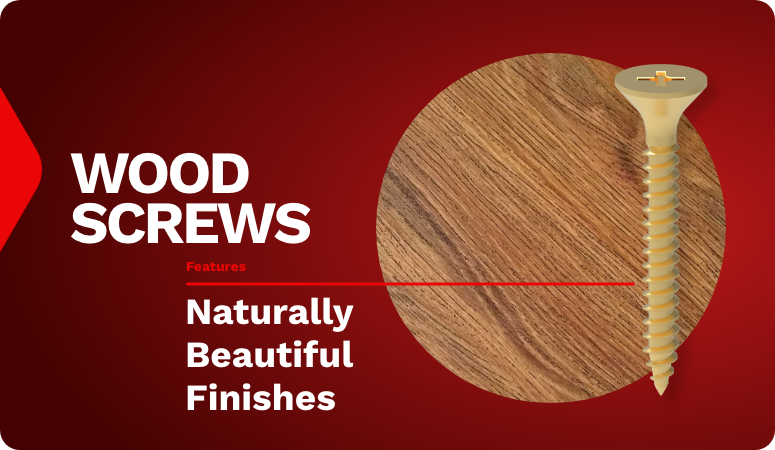
Many DIY projects begin and end with wood and woodwork. Wood screws offer the strength and stability required for successful construction. These screws almost always have a semi-threaded shank, which allows for ease of insertion and high levels of grip. The #8 size wood screw is the most versatile fastener for woodworking.
Practical use of wood screws
-
Joining wooden boards: These fasteners are excellent for wood-on-wood joints. This makes them ideal for constructing bookshelves, tables, or cabinets. They securely fasten horizontal or vertical panels. These screws also reduce the chances of wood stripping during the building process, which leaves a nice clean finish.
-
Building decks: Some decking screws are wood screws with excellent corrosion resistance. Wood screws are the go-to fastener for building decks and joining deck boards to joists. With these screws in your construction arsenal, you guarantee a sturdy and secure outdoor space for yourself and your family.
-
Building furniture: Wooden screws are versatile. They enable you to join large boards or slats of wood and make finer designs a breeze. As long as it's sturdy wood, you can confidently use a wooden screw.
Wooden screws are dependable and versatile, they can virtually be used in all wood applications. There are, however, some niche applications with wood where they may not be ideal. Heavy-duty fasteners like lag screws and lag bolts are more suitable for heavy pieces of wood like lumber. Carriage bolts will work better for fixing door handles, hooks, lathes, and locks. A nail and a hammer will be the right choice for super fine detail. Check out the next section to see how pocket-hole screws might be a great fit for wood too!
Pocket Hole Screws
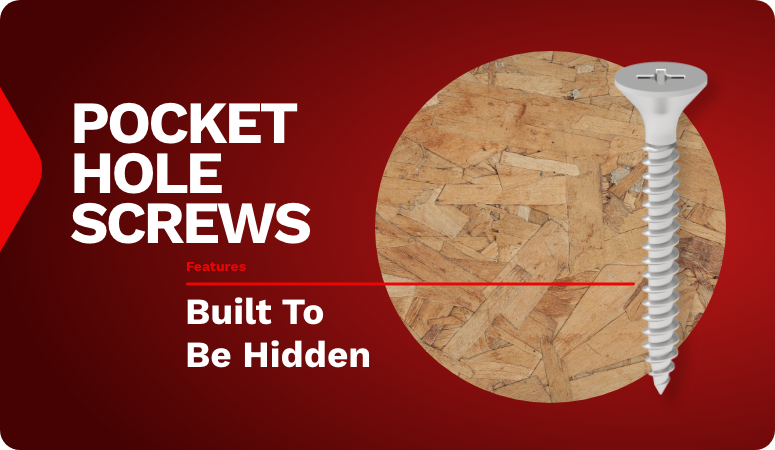
Pocket hole screws are named after their placement. A discreet pocket hole is pre-drilled effectively on the sides of a wooden strip. A screw is then drilled upward into the top board of a piece. This fastens two pieces of wood without leaving any trace on the top surface. While using these screws is an aesthetic choice, it has quickly become a discreet and robust solution for joining wooden pieces.
Shop Our Pocket Hole Wood Screws
The hidden strength
As mentioned, these screws are used for pre-drilled pocket holes. These screws feature a self-tapping tip that creates its hole, eliminating the need to drill pilot holes.
-
Square drive: Most pocket hole screws feature a square drive which reduces slippage during installation. The square drive also allows for greater torque from the fastening tool, so the screw essentially goes in fast and reduces the change for stripping.
-
Flat, washer-style head: Pocket hole screws feature a flat, washer-style head similar to carriage bolts or slotted head machine fasteners. It cushions the wood by preventing over-drilling and countersinking into sound materials. And while it sits on top of the surface of the wood, it sits flush with the pocket hole. So with time, if the joints of your furniture go weak, you can unscrew, make repairs and screw them back in.
Practical use of pocket hole screws
Pocket hole screws are typically used in furniture, cabinets, and interior trim applications.
-
Furniture making: When crafting tables or chairs, slotted head screws help hide the joints within the furniture giving it a more seamless and modern look.
-
Cabinet building: Pocket hole screws provide excellent support for building shelves and boxes for cabinets while staying out of view. Many professionals liberally use these to construct various parts of a cabinet.
-
Interior trim: Decorative trim, moldings, and baseboards can be fastened using pocket hole screws. Using pocket hole screws lets the design shine without the screw tarnishing its glory.
In places where hidden joints are preferred, pocket hole screws are an absolute star. Their ease of use and maintenance have made them a staple fastener for many furniture design enthusiasts who prefer a clean and modern look in their projects.
Drywall Screws
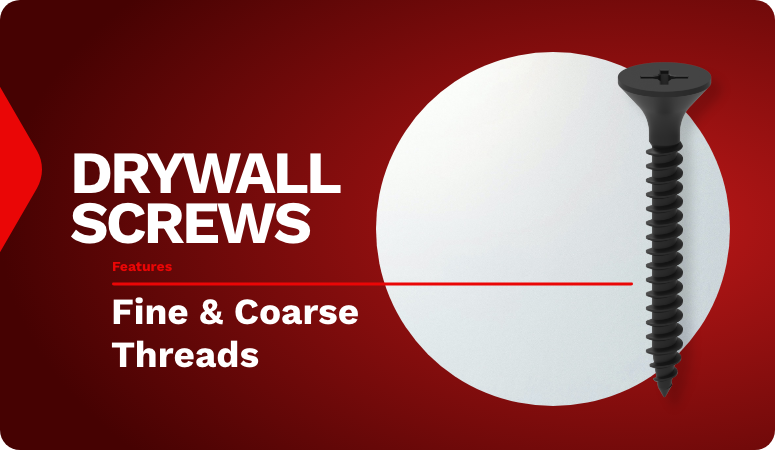
In the US and Canada, drywall screws are indispensable. Most homes and workplaces use these screws liberally and hold our walls together. Unique features within this screw make it far superior to nails.
Beyond surface-level strength
Drywall screws come with either a coarse or fine thread combined with a flat head, specifically designed for attaching drywall to studs. These screws provide a more secure hold and easy countersinking into the drywall.
-
Coarse thread: The coarse thread on drywall screws ensures a tight grip on the material, preventing sagging and enhancing stability. Coarse thread screws are used for wood studs, as they provide a secure fit without chipping away any wood and compromising the structural integrity of your installation.
-
Fine thread: Fine thread screws serve the same purpose as coarse thread screws but are made specifically for metal studs. In modern construction projects, these are the go-to fasteners for drywall installation.
-
Flat head: The flat head design makes it a breeze to countersink screws. This enables the screw to sit right under the surface of the material. We all know an excellent drywall install can't be differentiated from a standard wall. The flat head makes room for primer and plaster to create a seamless finish.
Practical use of drywall screws
-
Wall construction: It's in the name. A drywall screw is the ideal fastener for installing drywall to metal and wooden studs. They offer excellent grip and prevent sagging and stripping.
-
Ceiling installation: When attaching drywall to the ceiling, you need screws that can hold the weight of the drywall against gravity. That's where these screws shine and provide a strong and confident hold.
-
Renovations and repairs: These screws screw out as quickly as they screw in. This makes them ideal for renovations and repair of damaged drywall.
Drywall screws are exactly what they sound like. Screws for drywall. These fasteners are primarily distinguished based on their thread type. A coarse thread fastener is used to fasten drywall to wooden studs, while an exemplary thread fastener is used to fasten drywall to metal studs. These screws offer a secure fit and smooth finishing process. These screws are your trusted ally for first-time drywall installs, repair, and maintenance work.
Deck Screws
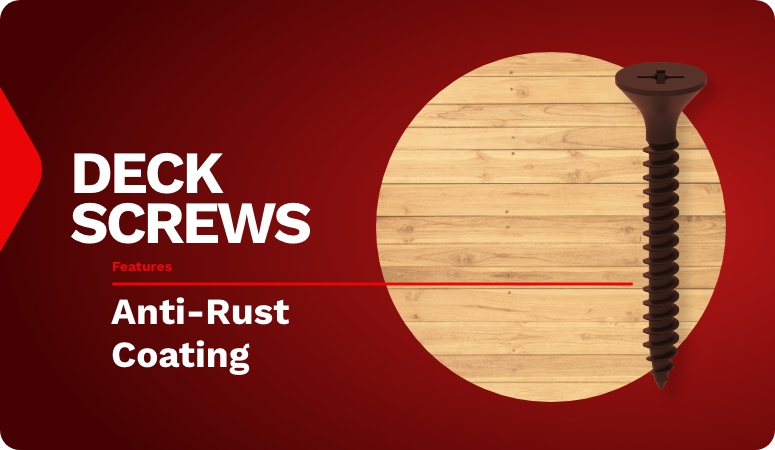
Deck screws are essentially wooden screws with corrosion resistance and can sustain high torque levels. They are usually made with stainless steel and then covered with a corrosion-resistant coating. This makes them ideal for outdoor use and to withstand the impact of elements over time.
Building Outdoors with Confidence
Decking screws are typically made with stainless steel and can withstand significant torque. Most deck screws use a TORX or a square drive for this reason. Here are some key attributes that make them the ideal fastener for decks.
-
TORX or square drive: Decking screws typically withstand high torque levels. These need to be superior to wooden screws. As there's little that can withstand outdoor factors, you want your screw to do the heavy lifting for you. Pushing a screw with high torque levels makes a strong connection and prevents loosening over time.
-
Sharp points: Pre-drilling can get tricky and exhausting as you put hundreds of screws in, around, and under your deck. The sharp point on deck screws eliminates pre-drilling, making the setup quick and easy.
-
Coarse threads: Coarse thread screws offer high levels of holding power in wood applications. This is the perfect choice for decks made of wood boards and stumps.
-
Weatherproof coatings: Most quality deck screws have a weatherproof coating or finish. This enhances their durability and resistance to environmental factors like rain and snow.
Practical use of deck screws
-
Deck building: As the name suggests, these screws are indispensable for outdoor decks. They fasten the deck boards to the underlying stumps and ensure a stable and lasting outdoor space.
-
Patio and deck furniture: The corrosion resistance also makes these screws ideal for outdoor furniture. Since they are wooden screws, they are versatile enough for furniture use.
Deck screws are the backbone of outdoor construction projects. Their corrosion resistance and ability to withstand high levels of torque make them the ideal choice for outdoor decks. Outdoor wooden structures made using these screws will endure the test of time and weather the elements with breeze.
Masonry Screws
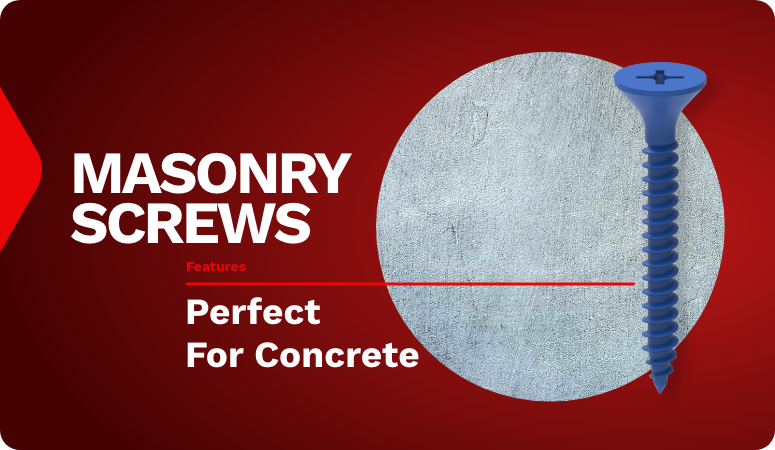
Masonry screws are the screws for concrete mortar joints and brick. These screws are tailored to withstand the toughest of pressure. Let's take a close look at these Mortar champions.
Shop Our Masonry / Concrete Screws
Fastening in stone
These screws are purpose-built for anchoring in sturdy materials like concrete and brick. They do require a pilot hole created using a carbide bit and hammer drill. Let's explore what makes these the best screws for masonry applications.
-
Specialized thread design: Masonry screws have a specialized thread design combined with a carbide bit and hammer drill, offering excellent grip.
-
Corrosion resistance: Masonry screws have a very high degree of corrosion resistance. With water and moisture common in many masonry applications, these screws can withstand constant exposure to water and other natural elements.
-
Strong and reliable: These screws are versatile in lightweight and heavy-duty masonry applications. They are solid and reliable fasteners created to be used with robust and reliable materials.
-
Ease of installation: Masonry screws are relatively easy to install compared to traditional anchor systems like hex bolts requiring special tools or procedures. They can often be used with standard power drills.
-
Multiple types: There are numerous varieties of masonry screws available, including screws, sleeve anchors, wedge anchors, and more.
-
Flush or recessed installation: Most masonry screws sit flush with the material's surface, creating a clean and flat surface for primer and plaster.
Features like these make masonry screws a dependable choice for applications like construction, renovation, and various outdoor projects.
Practical use of masonry screws
-
Securing hardware: Hanging flagpoles, hose reels, and loading docks need a robust and reliable fastener. These are often secured in concrete, where a masonry screw comes in clutch.
-
Hanging decor: If you have masonry walls, you know it can be challenging to hang anything on them. Masonry screws offer a secure and lasting fit for all your decor, including lamps and artwork.
Masonry screws are the go-to for concrete, mortar, or brick fasteners. Their ability to conquer these challenging materials makes them the only choice. They come in countersinking and surface mounting head types, making them invaluable in various applications.
Sheet Metal Screws
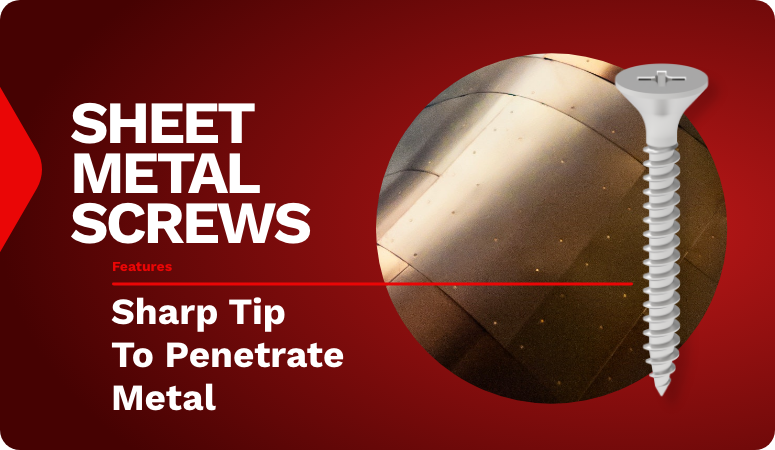
Metal is a relatively hard material. While it's not as hard as masonry, it poses a challenge. This is where sheet metal screws with sharp tips and fine threads save the day. They have become the preferred choice for attaching plastic, wood, or metal to other pieces of metal. Let's see what makes them unique.
Conquering Metal
Sheet metal screws are engineered with hardness in mind. Catering to the demands of metal fastening and wood and plastic, these screws are the most versatile screw out there.
-
Sharp Tips: Sharp tips on metal screws help puncture a hole into most metal and allow surfaces.
-
Fine Thread: Most sheet metal screws have a fine thread. They even feature a threaded shaft to enable minor adjustments.
Practical Use of Sheet Metal Screws
-
Metal-to-Metal Connections: Sheet metal screws fare exceptionally well regarding bare metal contact.
-
Metal-to-Wood or Plastic: When multiple surfaces are within a project, these screws are the most versatile. They also champion metal-to-metal fastening and hold plastic and wood to metal surfaces.
Sheet metal screws feature sharp tips and fine threads that enable efficient drilling and secure fastening. It's important not to confuse a sheet metal screw with a machine screw. Slotted head machine fasteners are reserved for machines and other electronics coupled with nuts and tapped holes. Sheet metal screws are only ideal for metal connections in construction projects.
Empower your DIY projects
Even DIY projects demand precision, and with the correct screw, you can nail it down. Choosing the right screw isn't merely about connecting materials; it's about ensuring longevity, strength, and ease of use. From wood screws that offer versatility in indoor use to deck screws that provide protection from outdoor elements, each screw serves a unique purpose. Masonry screws tackle hard surfaces like concrete and brick, while sheet metal screws are the staple for metal fastening needs. Knowing these screws and their application can help you select the perfect screw for your project.




